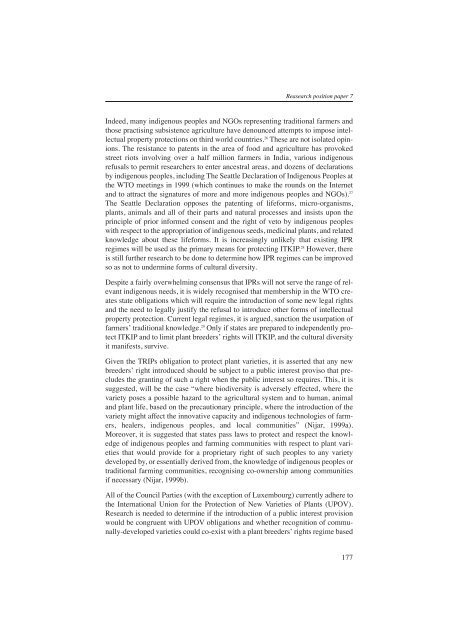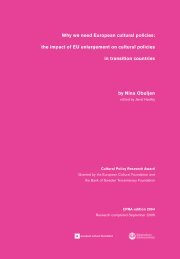Tony Bennett, Differing diversities - Council of Europe
Tony Bennett, Differing diversities - Council of Europe
Tony Bennett, Differing diversities - Council of Europe
Create successful ePaper yourself
Turn your PDF publications into a flip-book with our unique Google optimized e-Paper software.
Reasearch position paper 7Indeed, many indigenous peoples and NGOs representing traditional farmers andthose practising subsistence agriculture have denounced attempts to impose intellectualproperty protections on third world countries. 26 These are not isolated opinions.The resistance to patents in the area <strong>of</strong> food and agriculture has provokedstreet riots involving over a half million farmers in India, various indigenousrefusals to permit researchers to enter ancestral areas, and dozens <strong>of</strong> declarationsby indigenous peoples, including The Seattle Declaration <strong>of</strong> Indigenous Peoples atthe WTO meetings in 1999 (which continues to make the rounds on the Internetand to attract the signatures <strong>of</strong> more and more indigenous peoples and NGOs). 27The Seattle Declaration opposes the patenting <strong>of</strong> lifeforms, micro-organisms,plants, animals and all <strong>of</strong> their parts and natural processes and insists upon theprinciple <strong>of</strong> prior informed consent and the right <strong>of</strong> veto by indigenous peopleswith respect to the appropriation <strong>of</strong> indigenous seeds, medicinal plants, and relatedknowledge about these lifeforms. It is increasingly unlikely that existing IPRregimes will be used as the primary means for protecting ITKIP. 28 However, thereis still further research to be done to determine how IPR regimes can be improvedso as not to undermine forms <strong>of</strong> cultural diversity.Despite a fairly overwhelming consensus that IPRs will not serve the range <strong>of</strong> relevantindigenous needs, it is widely recognised that membership in the WTO createsstate obligations which will require the introduction <strong>of</strong> some new legal rightsand the need to legally justify the refusal to introduce other forms <strong>of</strong> intellectualproperty protection. Current legal regimes, it is argued, sanction the usurpation <strong>of</strong>farmers’ traditional knowledge. 29 Only if states are prepared to independently protectITKIP and to limit plant breeders’ rights will ITKIP, and the cultural diversityit manifests, survive.Given the TRIPs obligation to protect plant varieties, it is asserted that any newbreeders’ right introduced should be subject to a public interest proviso that precludesthe granting <strong>of</strong> such a right when the public interest so requires. This, it issuggested, will be the case “where biodiversity is adversely effected, where thevariety poses a possible hazard to the agricultural system and to human, animaland plant life, based on the precautionary principle, where the introduction <strong>of</strong> thevariety might affect the innovative capacity and indigenous technologies <strong>of</strong> farmers,healers, indigenous peoples, and local communities” (Nijar, 1999a).Moreover, it is suggested that states pass laws to protect and respect the knowledge<strong>of</strong> indigenous peoples and farming communities with respect to plant varietiesthat would provide for a proprietary right <strong>of</strong> such peoples to any varietydeveloped by, or essentially derived from, the knowledge <strong>of</strong> indigenous peoples ortraditional farming communities, recognising co-ownership among communitiesif necessary (Nijar, 1999b).All <strong>of</strong> the <strong>Council</strong> Parties (with the exception <strong>of</strong> Luxembourg) currently adhere tothe International Union for the Protection <strong>of</strong> New Varieties <strong>of</strong> Plants (UPOV).Research is needed to determine if the introduction <strong>of</strong> a public interest provisionwould be congruent with UPOV obligations and whether recognition <strong>of</strong> communally-developedvarieties could co-exist with a plant breeders’ rights regime based177














